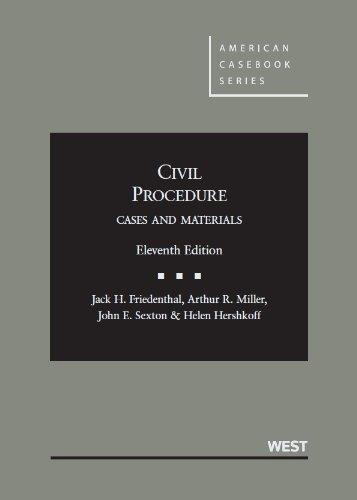5. As an alternative to abstention, a district court may invoke a procedure called certification that allows
Question:
5. As an alternative to abstention, a district court may invoke a procedure called certification that allows it to petition a state court to answer an unresolved question of state law. See Challener, Distinguishing Certification from Abstention in Diversity Cases:
Postponement versus Abdication of the Duty to Exercise Jurisdiction, 38 Rutgers L.J. 847
(2007). In 1945, Florida became the first state to adopt such a procedure, and its use by the federal courts was endorsed by the Supreme Court in Clay v. Sun Insurance Office Ltd., 363 U.S. 207, 80 S.Ct. 1222, 4 L.Ed.2d 1170 (1960). The procedure now is available in forty-nine states (North Carolina is the exception), the District of Columbia, and Puerto Rico.
See Robinson, Note—Right, But for the Wrong Reasons: How a Certified Question to the Supreme Court of North Carolina Could Have Alleviated Conflicting Views and Brought Clarity to North Carolina State Law, 34 N.C. Cent. L. Rev. 230 (2012). Certification procedures vary; some high state courts accept questions only from the Supreme Court, while others also answer questions from the federal courts of appeal, federal district courts, and sister states. See Winship, Cooperative Interbranch Federalism: Certification of State-Law Questions by Federal Agencies, 63 Vand. L. Rev. 181 (2010). The Supreme Court appeared to express a preference for certification in ARIZONANS FOR OFFICIAL ENGLISH v.
ARIZONA, 520 U.S. 43, 76, 117 S.Ct. 1055, 1073, 137 L.Ed.2d 170, 199 (1997) as a way to reduce costs and ensure an “authoritative response” from the state. See Thomas-
Jensen, Certification after Arizonans for Official English v. Arizona: A Survey of Federal Appellate Courts’ Practices, 87 Denv. U. L. Rev. 139 (2009).
Step by Step Answer:

Civil Procedure Cases And Materials
ISBN: 9780314280169
11th Edition
Authors: Jack Friedenthal, Arthur Miller, John Sexton, Helen Hershkoff






